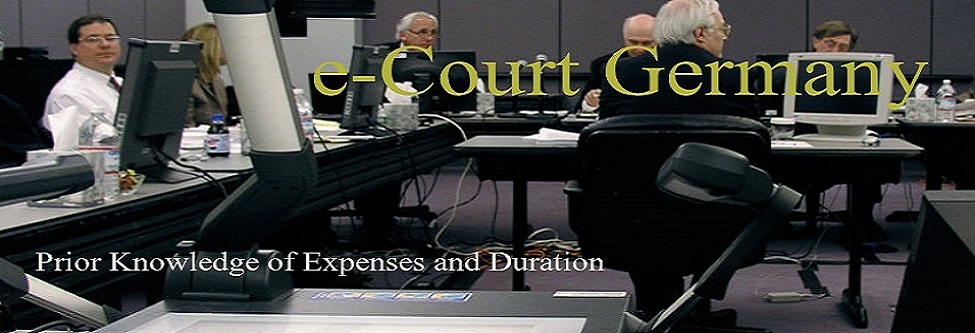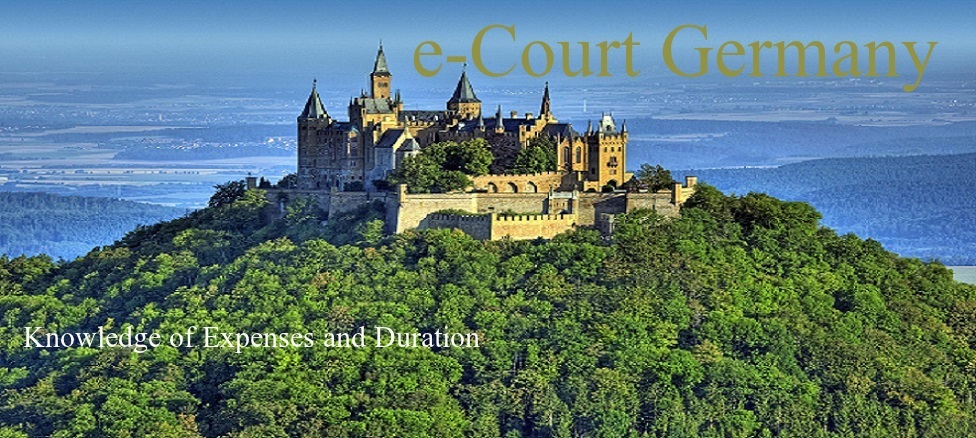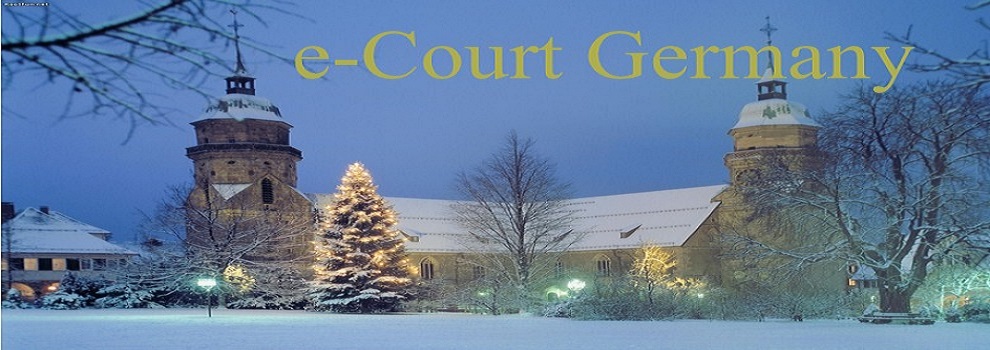(amount mentioned is valid through 2013 & 2014)
Witnesses in e-court statements are only allowed as evidence if the statement is authenticated/attested by a notary. This means that the notary confirms the identity of the person(s) who signed
the document(s) for deposit. The e-Court notary can be asked to complete this task at an additional cost of EUR120, however also other notaries not registered with e-Court are accepted.
Notarized evidence from witnesses in e-court proceedings are allowed

Recent Developments in Arbitration Law in Germany
source : Dirk Otto
In 1998 Germany enacted a new Arbitration Law which is closely based on the UNCITRAL Model Law. This Article examines recent judicial decisions applying the new law.
Arbitration agreements, bankruptcy and shareholder disputes
‘In a recent decision Germany’s Federal Supreme Court has strengthened the legal effect of arbitration clauses in a bankruptcy and the arbitrability of shareholder disputes. The case concerned a bankrupt company the Articles of Association of which contained a clause that all disputes between the company and its shareholders are subject to arbitration. The court-appointed receiver alleged that the company illegally repaid parts of the share capital to some shareholders and commenced litigation before a state court, claiming that he as a bankruptcy receiver is not bound by the arbitration agreement and secondly, that a dispute between a company and its shareholders concerning the pay-up of share capital is not capable of settlement by arbitration.
Germany’s highest Appellate Court disagreed and held that a court-appointed receiver is bound by an arbitration agreement entered into by the company he is administering as the receiver is acting on behalf of the bankrupt company and not on his own. The court also overruled earlier precedents and held that under Germany’s new arbitration law enacted in 1998 disputes between a company and its shareholders regarding the payment of capital contributions are capable of settlement by arbitration. The reason for this is that a receiver would be able to enter into a settlement with a shareholder regarding such disputed claims, that there is no overriding public interest which would prohibit a compromise and that any disputes which can be the subject of a compromise can also be settled by arbitration.
Arbitration clauses in by-laws of associations
In another decision the Federal Supreme Court had to decide whether a dispute resolution body instituted by an association qualifies as an “arbitration tribunal”. The case involved an “arbitration tribunal” subject to the by-laws of a dog-owners association which, according to its by-laws, was competent to decide all disputes between the association and its members with binding effect. The members of such tribunal were elected by the annual assembly of the dog-owners association and the parties in an individual dispute had no influence on the composition of such tribunal. The by-laws did not contain any provisions regarding the impartiality of such tribunal. The Supreme Court held that as a general rule the by-laws of any association may provide for disputes between the association and its members to be referred to arbitration. However as a minimum requirement any "arbitration tribunal" to which a dispute is referred must be composed of independent arbitrators and must apply just and fair proceedings. It held that a permanent tribunal the members of which are elected by the association itself lacks he necessary independence and impartiality and therefore does not constitute an arbitration tribunal. Accordingly all decisions of such a “tribunal” can be challenged before a court of law.
Enforcement of Foreign Awards and violation of ordre public
The Bavarian Supreme Court had to determine whether to allow enforcement of a Russian arbitration award. The parties to the dispute had commenced arbitration. During the arbitration proceedings the parties had entered into a settlement agreement which settled all disputes between them. The Russian party had agreed to discontinue arbitration proceedings and to inform the arbitration tribunal accordingly. However the Russian party failed to comply with such obligation, continued arbitration proceedings and obtained an award against the other party. The Bavarian Supreme Court refused enforcement of the arbitration award on the basis of Art. 5 (2) (b) of the New York Convention and held that the enforcement of the award would violate the ordre public as the Russian party acted in bad faith and caused the other party to believe that arbitration proceedings would be discontinued, thus depriving such party of the opportunity to defend itself.
TOPICS:
- ABOUT e-COURT
- home
- preliminary information
- introduction ( About us )
- benefits
- scope of legal areas
- directorate
- supervisory board
- advisory council
- originating partners
- e-Court & ADRpartners
- articles of operation
- privacy
- legal information
- in the news
- ( e-Court versus ADR )
- COSTS
- *** introduction
- *** membership
- *** court fee
- *** escrow
- *** hearings costs
- *** attestation costs
- *** extrajudicial costs
- *** legal counsel fees
- *** subsequent costs
- frequently asked questions
- OFFLINE NETWORKING
Endorsements ( 1/2000 + ):
- Patricia M. Swerhone
Waters and Associates, Barristers & Solicitors, Toronto - Kenneth J. Byrne
Immigration and Real Estate Lawyer at Benson Buffett, Newfoundland And Labrador - Joseph W.J. F.
General counsel at Law Office, New Brunswick, Canada - Diana McGuire
Foord and Davies Law Firm, Ottawa - Amy M. Crosbie
Partner at Curtis, Dawe, Newfoundland And Labrador - Justice Clark
Partner at Simmons Da Silva + Sinton LLP, Toronto - ( Endorsements continued.....)















